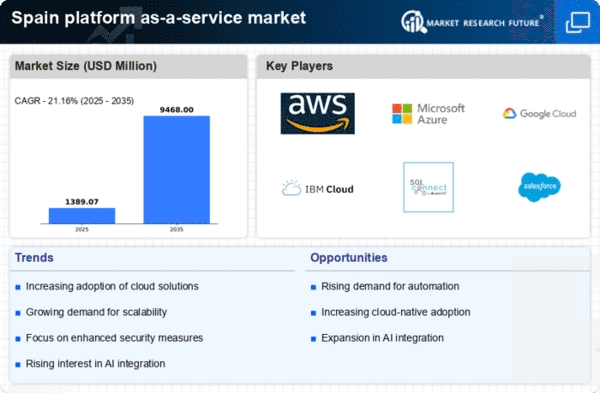The platform as-a-service market in Spain is characterized by a dynamic competitive landscape, driven by rapid technological advancements and increasing demand for cloud-based solutions. Major players such as Amazon Web Services (US), Microsoft Azure (US), and Google Cloud Platform (US) are at the forefront, leveraging their extensive resources to innovate and expand their service offerings. These companies focus on enhancing user experience through advanced analytics, machine learning capabilities, and robust security measures. Their strategic positioning emphasizes not only technological superiority but also the importance of regional partnerships and localized services, which collectively shape a competitive environment that is both aggressive and collaborative.
Key business tactics employed by these companies include optimizing supply chains and localizing services to better meet the needs of Spanish enterprises. The market appears moderately fragmented, with a mix of established giants and emerging players vying for market share. This competitive structure allows for a diverse range of offerings, catering to various customer segments, from small businesses to large enterprises. The influence of key players is substantial, as they set industry standards and drive innovation, thereby shaping the overall market dynamics.
In October 2025, Amazon Web Services (US) announced the launch of a new data center in Madrid, aimed at enhancing its service delivery and reducing latency for local customers. This strategic move underscores AWS's commitment to regional expansion and its focus on providing tailored solutions that meet the specific needs of the Spanish market. By investing in local infrastructure, AWS not only strengthens its competitive position but also fosters trust among potential clients who prioritize data sovereignty and compliance with local regulations.
In September 2025, Microsoft Azure (US) unveiled a partnership with a leading Spanish telecommunications provider to enhance its cloud services. This collaboration is expected to facilitate the integration of advanced cloud solutions into the telecommunications sector, thereby enabling businesses to leverage cutting-edge technologies such as 5G and IoT. The strategic importance of this partnership lies in its potential to create synergies that enhance service delivery and expand market reach, positioning Microsoft Azure as a key player in the digital transformation of Spanish enterprises.
In August 2025, Google Cloud Platform (US) launched a new initiative focused on sustainability, aiming to help Spanish businesses reduce their carbon footprint through cloud-based solutions. This initiative reflects a growing trend towards environmental responsibility within the tech industry. By aligning its offerings with sustainability goals, Google Cloud not only differentiates itself in a competitive market but also appeals to a customer base increasingly concerned with corporate social responsibility.
As of November 2025, current trends in the platform as-a-service market are heavily influenced by digitalization, sustainability, and the integration of artificial intelligence. Strategic alliances are becoming increasingly vital, as companies recognize the need to collaborate to enhance their service offerings and meet evolving customer demands. Looking ahead, competitive differentiation is likely to shift from price-based strategies to a focus on innovation, technological advancements, and supply chain reliability. This evolution suggests that companies will need to invest in research and development to stay ahead in a rapidly changing landscape.

















